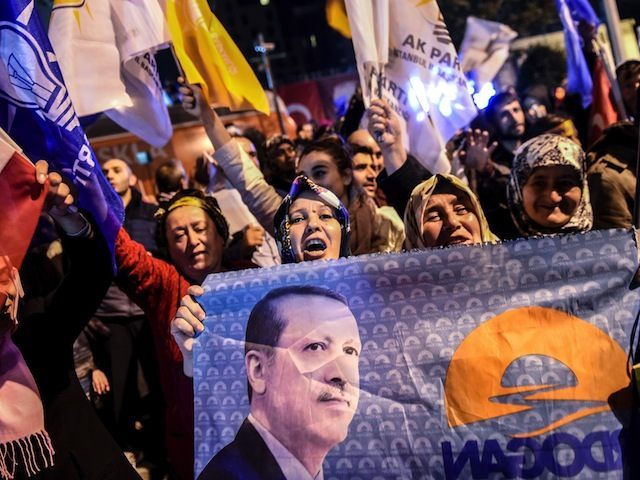Turkish President’s Tayyip Erdoğan’s Justice and Development Party, or AKP, has declared victory in Sunday’s parliamentary election. After 95 percent of the votes were counted from the 175,000 polling stations, AKP is estimated to have won over 50 percent.
This would give Erdoğan a majority 325 seats in the 550-seat parliament, but is short of his 367 goal. Time described the “unexpected” results as “dashing opposition hopes and cementing the rule [of] Erdoğan.”
Initial estimates show the main opposition Republican People’s Party, or CHP, winning around 25 percent of the vote, which secures 134 seats. The pro-Kurdish People’s Democratic Party, or HDP, won 10 percent, which guarantees representation in the Parliament while also blocking Erdoğan from gaining a supermajority.
This is the second election Turkey has held this year. The June 7th election failed to give any party an outright majority. Erdoğan’s AKP won only 258 seats, a loss of 53 seats. CHP secured 132 seats. HDP won 13 percent of the vote and 80 seats, a net increase of 51 seats. Erdoğan was forced to see a coalition as his AKP had lost its decade old majority. Negotiations with CHP broke down in August, which resulted in today’s snap election.
In a June 11th op-ed, U.S. Senator and GOP presidential candidate Ted Cruz (R-TX) celebrated the June 7th result:
This is good news for Turkey, and it should be good news for the United States as well. Turkey has been a long-standing friend to our nation, and is an important NATO ally. But Mr. Erdogan’s increasingly autocratic, Islamist and anti-American policies, largely un-rebuked by the Obama administration, have threatened this relationship. Under his rule, Turkey has become a leader in Internet censorship and the persecution of journalists. Mr. Erdogan’s administration has been aggressively hostile to our ally Israel, further inflaming regional tensions. By withholding access to the NATO air base at Incirlik, Turkey has further jeopardized our already anemic campaign against the spread of ISIS along Turkey’s borders with Syria and Iraq.
The shining light in today’s result is Erdoğan’s failure to gain the supermajority. Without a supermajority, Erdoğan is unable to pass a constitutional referendum creating an executive presidency. Opponents of Erdoğan’s efforts fear it will “herald an increasingly authoritarian rule.” In essence, Erdoğan is seeking to take Putin-like control over Turkey under the guise of democratic reform.
In the months leading up to today’s election, there was an unusual uptick in violence, civil strife, media lockdowns and terrorism. On October 10th, two bombs exploded in Turkey’s capital of Ankara during a peace rally organized by supporters of the pro-Kurdish HDP, killing over 95 people and injuring another 400. Erdoğan’s government holds the Islamic State (ISIS) responsible. Erdoğan used the bombing as a rallying cry for national security.
On October 28th, police shut down two opposition television channels – one linked to a cleric who spearheaded “a corruption investigation of Erdogan’s inner circle in 2013.” Erdoğan has jailed critical journalists and tightened government control over the internet.
Erdoğan has long sought to have Turkey enter the EU. Membership must be approved by all 28 member states. In 2014, David McAllister, the lead candidate of Chancellor Angela Merkel’s Christian Democratic Union for European Parliament, openly opposed Turkey’s membership because Erdoğan’s “current assault on freedom of expression in no way conforms with European standards.” However, this past October, it was reported that Merkel offered Erdoğan a “dirty deal” to speed up Turkey’s membership application in return for Erdoğan accepting migrants rejected by the EU during a visit to Turkey. Just weeks earlier, Merkel had “reiterated her opposition to Turkey joining the EU.”
As the Middle East’s sole member of NATO, Turkey’s domestic affairs are of strategic interest to the United States. Turkey was long considered secular and modern. However, since Erdoğan has seized control in 2002, the country’s posture in geopolitical affairs has dramatically changed. Erdoğan is openly hostile to Israel, saying just last year that Israel’s “barbarism has surpassed even Hitler’s.” It should come as no surprise that Hamas celebrated Erdoğan’s victory today on Twitter as “a win for democracy and for Turkey.” Erdoğan has ceased all Turkish military cooperation with Israel.
Erdoğan supports the Muslim Brotherhood and has “slammed” the death penalty ruling against Mohamed Morsi, while also calling Egyptian President Abdel Fatah al-Sisi a “tyrant.”
Erdoğan banned the sale of alcohol on Monday’s in 2013. He has also started automatically enrolling children in religious schools while cutting funding for secular institutions. This past April, Erdoğan visited Tehran seeking to build “deeper” economic ties.
Today’s election result will lead to further domestic turmoil and imbalance in the Middle East. Only time will tell if Turkey’s secular forces will be able to reassert control over the country.

COMMENTS
Please let us know if you're having issues with commenting.